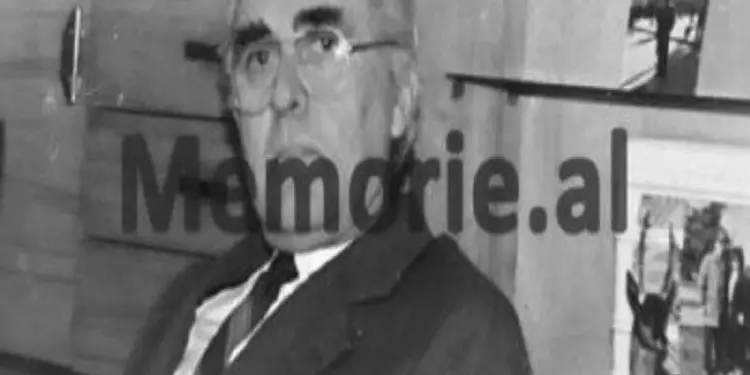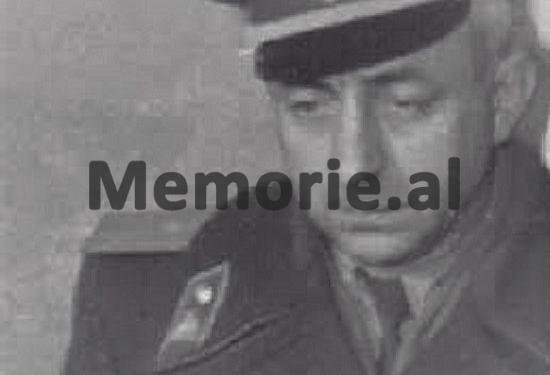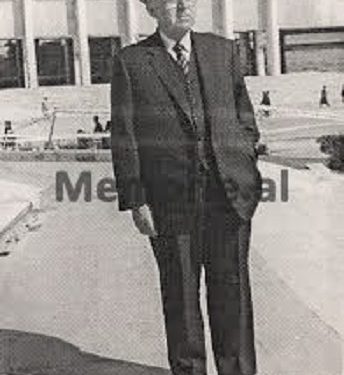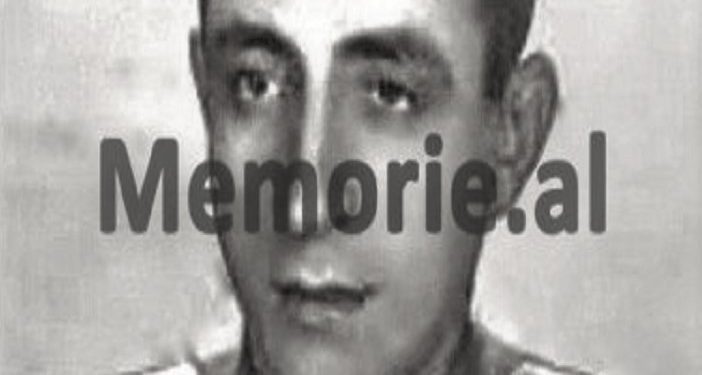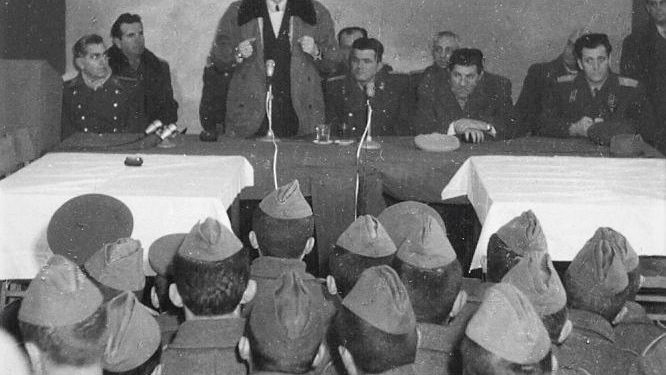Dashnor Kaloçi
-The confession of Major, Ahmet Mehmet, former inspector at the General Staff of the Army, about the punishment of the dissident colonel, who wrote a letter to Enver, where he argued the harm that the removal of ranks in the Army would bring.-
Memorie.al / “After the discussion of the Minister of People’s Defense, Beqir Balluku, who was supported by several senior military officers, the floor was given to the Attorney General of the Army, who stated: The letter that Dilaver Radëshi has sent to the senior leadership of the Party, is an opposition to the party line and as such, it constitutes a legal and criminal violation. Based on this, in the name of the people, Dilaver Radëshi is arrested’. After that, Dilaveri was put in irons in the hall and immediately sent to Tirana prison.
This is how the former major officer of the Ministry of Defense, Ahmet Mehmeti, remembered that meeting with the soldiers of the Tirana Garrison, in April 1966, when his colleague and close friend, Colonel Dilaver Radëshi, a former partisan and leading cadre in Mehmet Shehu’s first Assault Brigade during the War, then graduated with Gold Medals from two military academies in the Soviet Union, who was also a researcher and military historian.
Regarding these and other unknown events of 1966, when Albanian soldiers were stripped of their ranks, we know from an interview we took years ago with the retired major, Ahmet Mehmeti, originally from the village of Tolari i Përmet, a former courier partisan, graduated from two military academies and then from the Faculty of History and Philology of the State University of Tirana, who for years served as an inspector in the branch of Defense Planning and Staff Preparation, at the General Staff in the Ministry of Defense Popular in Tirana.
Mr. Mehmeti, when was the idea of removing ranks for the Albanian Army first floated?
The idea of removing the ranks in our army was first raised in April 1966, in the “Open Letter” sent by the Political Bureau of the Central Committee of the PPSh to all the basic organizations of the communists. In that letter, which had three main axes, it was about the reforms that had to be made and the further revolutionization of the party, the power of the army.
One of the main points raised in the issue of the army was the removal of ranks. In that letter from the Political Bureau, the corresponding arguments were given as to why the ranks had to be removed, and among the main ones were: when the partisan army was formed, during the War, there were no ranks, we had borrowed the ranks from the Russians and, after breaking with them, we had no reason to keep them; and the last argument was that; we had taken the army from the people and we had no reason to separate ourselves from the people, making distinctions through ranks. These were the three main arguments, or more precisely, the pretext raised by the Open Letter of the Central Committee of the PPSh for the removal of ranks in the army
What was the real reason for removing the ranks of the Albanian military?
All the arguments raised in the Open Letter of the Political Bureau, for the abolition of ranks, were only demagoguery, because the truth was different. After the break with the Russians, Enver no longer trusted the officers who had graduated from the Soviet Union and was afraid that they would stage a military coup. Therefore he launched a strike against them, first by removing their ranks.
How was the Politburo’s Open Letter received in the basic party organizations in the army?
The Open Letter, which was worked on in all basic organizations, was also worked on in the party organization of the General Staff, where I was also a part, since at that time; I was an instructor in the Planning Directorate of the Staff and at the same time a party member. That meeting for the preparation of the Open Letter in the party organization of the General Staff, which took place in April 1966, in the office of Petri Dumas, was led by the secretary of the organization, Colonel Xhaferr Peçi.
While the main report, in the breakdown of the letter, which was prepared by a working group, was held by Colonel Elami Hado. Among other things, in his report, Elamiu also stopped at the removal of ranks in the Army, arguing that that action would bring bad consequences in the strengthening of military discipline and in the rigorous implementation of preparation duties for the defense of the country.
After Elamiu, Colonel Dilaver Radëshi also stood up and discussed who had prepared his discussion in writing. In high tones, Dilaveri criticized the style and working method of the General Staff and emphasized the problem of removing ranks, considering it as a very big mistake that was being made in the Army.
After giving his thoughts on strengthening the country’s defense in the new conditions, when Albania had distanced itself from the countries of the Eastern Communist Bloc, Dilaveri made harsh and direct criticisms of some of the top leaders of the Army. At the time that Dilaveri was criticizing the main leaders of the Army by name, the Chief of the General Staff, Lieutenant-General Petrit Dume, told Xhafer Peç to stop the meeting immediately.
Was the meeting interrupted?
After Petriti’s intervention, Xhaferi interrupted the meeting, taking us out into the corridor, while Petriti himself, who stayed inside his office, immediately, got on the phone with the PPSh Central Committee, talking to Hysni Kapo, the corresponding secretary covering the Army. It is not known what Petriti discussed with Hysniu, but after a few minutes he came out and told us: “Today the meeting closes here and it will continue tomorrow, in the collegium hall of the Ministry and it will be an extended meeting”.
How did the meeting take place the next day and what happened there to those who were against the idea of abolishing ranks in the Army?
The meeting took place the following afternoon in the collegium hall of the Ministry of Defense and only the Director of the Political Directorate of the Army, lieutenant-general Hito Çako and his deputy, lieutenant-general Dilaver Poçi, came as delegates, after the Minister of Defense, general- lieutenant, Beqir Balluku, was in the People’s Republic of China, with a government delegation.
The edge of all the discussions in that meeting was directed against the thoughts and suggestions made the night before by Dilaveri and Elami Hadon, with the harsh criticism of the removal of ranks and the method and work style of the main leaders of the Ministry and the General Staff. . In conclusion, the meeting concluded on the expulsion of Dilaveri from the party and the transfer of Elamiu from the General Staff of the Army, to the Infantry Brigade of Rreshen, as chief Xenjo.
What position did the two colonels, Dilaver Radëshi and Elami Hado, take in that meeting?
Elamiu and Dilaveri did not budge from what they had said the night before and did not back down even after the criticisms that were made there. For the sake of truth, I mean that, with a few exceptions, the greater part of all of us who were there in that hall, in mind and heart were with Elamius and Dilaver, and quite aware that they were right. . But to those two, they tried to shut their mouths, so that the rest of us would be silent.
But Dilaveri did not leave it at that. Before coming to that meeting, he had sent a letter directly to Enver Hoxha, where, among other things, he argued why the ranks should not be removed. Before sending that letter to Enver, where Dilaveri put his name and signature, he came to my office to show me. I gave him some suggestions, only on the spelling side; since Dilaveri had typed it all up him and didn’t need anyone’s opinion.
What happened after the second meeting and the letter that Dilaveri sent to Enver Hoxha?
After the second meeting that took place in the collegium hall of the Ministry of Defense, where it was decided to expel Dilaver from the party and transfer Elami, I accompanied Dilaver to the building of the Executive Committee, in the center of Tirana, talking with him about all that was discussed in both meetings. There I broke up with Dilaver, as he had a house at Madrasa, while me at “Mine Peza”.
Dilaveri was exacting about what he had written and said and did not retreat from his own. The day after that meeting, by order of Minister Beqir Balluku, another meeting was organized and held in the hall of the Military House on Kavaja Street (where the Chamber of Commerce is today), where all the officers of the Garrison of Tirana.
Dilaver had been forced to sit in the first row and next to him; there were two officers of the State Security. Beqir Balluku, who had returned from China the night before, spoke first from the presidium of the meeting, and the focus of his discussion was: the meaning and implementation of the Open Letter of the Central Committee, and especially the problem of removing ranks in the army. After him, some high-ranking officials rose from the hall and discussed who supported the minister. There was also one of them who said: “Our mothers were not born with ranks on their shoulders”!
Then the floor was given to the Attorney General of the Army, Colonel Sotir Spiro, who declared: “The letter that Dilaver Radëshi has sent to the high leadership of the Party (he did not mention Enver Hoxha, to whom Dilaveri addressed the letter), is an opposition to the Party’s line and as such, it constitutes a legal and criminal violation. Based on this, in the name of the people, Dilaver Radëshi is arrested.” After that, Dilaveri was put in irons in the hall and immediately sent to Tirana prison.
How Dilaveri react when he was arrested and what did was the reaction of the hall?
Dilaveri was very touched when he was arrested, but he didn’t say a word and just turned his head back, where I was one row behind him. Even most of the soldiers who were in that hall remained silent and did not speak a word. There was also someone who, when we left the hall, expressed his displeasure about Dilaveri’s arrest.
Let’s go back to Dilaveri’s letter to Enver. Since that time, but also after, it has been said that the letter was anonymous, without a name, how does the truth stand?
Dilaver’s letter had his name, surname and signature. But at that time, such a letter, but without a name (anonymous), objecting to the removal of ranks, was also sent to Enver Hoxha by a high and very important cadre of the Ministry of the Interior, who, as it turned out later, was Major General Halim Xhelo, Deputy Minister of the Interior and at the same time Chief of Army Security. For this he was imprisoned and it is said that he poisoned himself or hanged himself in the prison of Burrel, on the very day that Beqir Balluku was arrested.
How is this coincidence explained?
It is said that Halim Xhelo had hopes that Beqir Balluku would save him, who had once supported him when he wrote the letter to Enver. And when Beqir was arrested, Halim lost hope and ended his life.
Why, Beqir Balluku was not in favor of removing the ranks?
What I told you above about Halim Xhelo speaks best about this.
Given the fact that you were his friend and had read the letter he had sent to Enver, did you have any problems afterwards?
In the evening of that day that Dilaveri was arrested, his wife came to my house, with the whole girl. When I opened the door, they asked me where Diloja was. With deep regret I tried to calm them down and told them it was okay. I told them that, the next day, they should go to the secretary of the Party Committee of the Ministry of Defense, Niko Dodbiba, as only he could explain everything to them.
How did they react?
Dilaver’s wife turned yellow in the face, while the girl began to cry, and they left. I closed the door and to tell you the truth, those minutes that followed were the most difficult moments I’ve had in my entire life. Shortly after they left, there was another knock on the door and when I opened it I saw two unfamiliar faces. One of them was dressed in a blue coat and the other in a brown one, which at that time were usually worn by undercover agents of the State Security.
What were they looking for and what did they tell them?
They asked me if a man lived in that palace, mentioning a name I had never heard. After that, one of them asked me what my name was and when I told him my name, they left. The purpose of their arrival was to verify which door the wife and daughter of Dilaver Radësh had knocked on. The next day of that night, two Security officers from the Ministry of the Interior came to my office to investigate what we had to say about Dilaver.
How did you answer them?
My office colleague and I said: “What Dilaveri had, he told him orally and in writing. We don’t know a single word anymore.” After that they left, while I was removed from the Ministry and sent to a ward on the outskirts of Tirana.
Mehmet’s testimony: “Enver Hoxha was afraid of military graduates in the Soviet Union, that they would stage a coup to overthrow him”!
Regarding the real reason why Enver Hoxha decided to remove the ranks from the shoulders of Albanian soldiers and whether he was influenced by China and Mao Zedong for this, Ahmet Mehmeti testifies: “First of all, I am telling you that China Mao Zedong did not have the same influence on the idea put forward at that time for the removal of ranks for Albanian soldiers, since at that time the Chinese army had the ranks for themselves and there was no discussion about their removal.
The real reason why Enver Hoxha wanted to remove the ranks from the Albanian army was his fear of a possible military coup, which had been on his mind since the break with the Soviet Union in 1961. This he he connected it with the fact that most of the senior Albanian military had finished their studies and had graduated from the military academies of the Soviet Union.
So, Enver was afraid of the Albanian military, lest they were connected to Moscow and one fine day, they would make a coup to overthrow him from power. Based on this idea that was brewing in his head, since the beginning of the 60s, in order to dispel the myth that was created at that time about the senior officers of the Albanian army, he decided to first remove their ranks, making everyone the same.
Before deciding on the removal of ranks, Enver had gradually started to displace the senior Albanian military, removing them from the General Staff and transferring them to different districts of the country. In the active Army, which was held in the city of Durrës, just a short time after the Open Letter, among other things, Enveri said: “The staffs and units must be renewed with new cadres who have finished their studies here”.
After this activity, some of the main Army generals who were in the Ministry of Defense, removed them from Tirana and sent them to other districts. Thus, General-Colonel Vehbi Hoxha (“Hero of the People”) was removed from the General Staff of the Army and sent to Shkodër, General-Colonel Sadik Bekteshi (“Hero of the People”) was sent to Korça, Major-General Vaskë Gjino , was sent to the Naval-Military Fleet, Major-General Spiro Shalesi, was sent to Burrel, Major-General Ernest Jakova, was sent to the Military Academy, etc.
Likewise, at that time, a large number of military personnel with lower ranks, such as colonels, lieutenant colonels and majors, were removed from Tirana and sent to various departments and units throughout the country. After that, Enver brought to the main leadership of the army young cadres, even some from the working class, who would then be ready for anything”. Memorie.al




